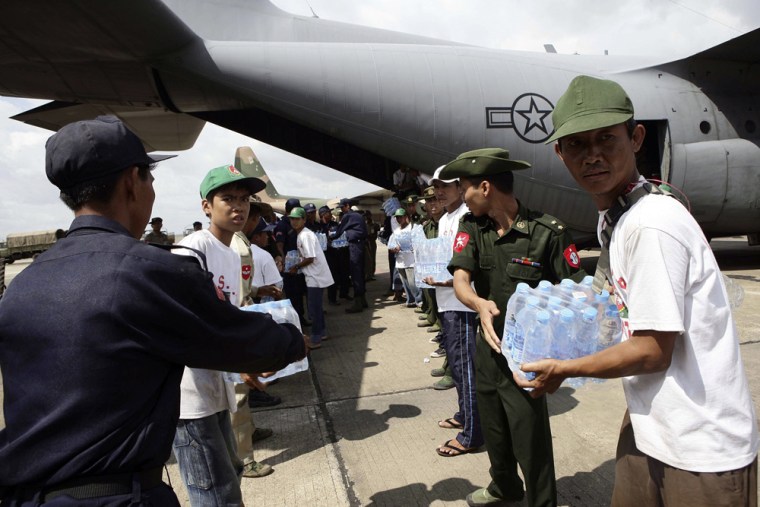European Union nations urged Myanmar's military leaders Tuesday to let in international aid to cyclone victims, saying that failure to do so could amount to a crime against humanity.
EU foreign policy chief Javier Solana said international donors must make getting aid to the victims a priority in coming days.
"At this moment, the most important objective is to get the humanitarian aid inside the country. There are many people that are suffering and ... we have to use all the means to help those people," Solana told reporters ahead of special EU talks to coordinate aid efforts for Myanmar.
EU nations must push the United Nations to take action to force Myanmar's junta to open its borders to aid shipments and workers, said Diego Lopez Garrido, Spain's state secretary for European affairs.
"If the military junta seriously blocks the arrival of aid, this would be similar to a crime against humanity," Lopez Garrido told reporters before the EU meeting.
Solana said the U.N. Security Council "can open" some new diplomatic channels to convince Myanmar to let humanitarian aid in to the country. He said he has phoned counterparts in Asian nations neighboring Myanmar to pressure the junta.
Reports that junta is keeping some aid
The U.N. said very little international aid is getting to cyclone victims amid reports that the nation's military regime is hoarding some of the foreign aid for itself. They said survivors face disease and starvation if aid is not provided soon.
Myanmar has agreed to accept more American aid, officials said Tuesday, opening the door for what could be a massive relief operation as the United Nations warned that less than a quarter of victims’ needs are being met 10 days after the devastating cyclone struck.
Logistical bottlenecks, poor infrastructure and restrictions imposed by Myanmar’s isolationist junta were delaying the desperately needed aid for some 2 million severely affected survivors of the May 3 cyclone.
The government says about 62,000 people are dead or missing, but the United Nations has suggested the death toll is likely to be more than 100,000.
While the survivors — mostly poor peasants who grew rice for their livelihood — face disease and starvation, the authoritarian junta continued to bar nearly all foreigners experienced in managing such catastrophes.
It has largely only allowed supplies from the outside. Two U.S. planes and a U.N. convoy have already delivered aid. In an apparent concession, the junta seemed set to allow U.S. supply planes to continue to land Wednesday.
But armed police checkpoints were set up outside Yangon, the main city, on the roads to the hard-hit Irrawaddy delta, and all foreigners were being sent back by policemen who took down their names and passport numbers.
“No foreigners allowed,” a policeman said Tuesday after waving a car back.
Despite the junta’s restrictions, countless images of the misery in Irrawaddy have already stirred the world.
Survivors are refugees in their own land
The survivors, who have become refugees in their own land, are packed into Buddhist monasteries or camped in the open, drinking dirty water contaminated by dead bodies and animal carcasses. Food and medicines are scarce.
People complain that the junta’s soldiers are handing out rotten food while keeping the best for themselves. Thousands of children are orphaned and suffering from fever, diarrhea and respiratory infections.
“There is obviously still a lot of frustration that this aid effort hasn’t picked up pace and gotten under way as quickly as it should have,” said Richard Horsey, the spokesman of the U.N. humanitarian operation in Bangkok, Thailand.
He said the U.N.’s World Food Program is getting in 20 percent of the food aid needed. “That is a characterization of the program as a whole. We are not reaching enough people quickly enough,” he said.
U.N. Secretary-General Ban Ki-moon has also criticized the military leaders for their “unacceptably slow response” to the crisis.
Germany's development minister, Heidemarie Wieczorek-Zeul, said China and Russia must be swayed to join U.N. Security Council members' calls to take action to pressure Myanmar.
"There is a risk that further ten of thousands of people might die because there is no access to them, because they cannot be treated and they have no clean water," she said.
China, Russia reluctant to push Myanmar
France, Britain and the United States, three of the U.N. Security Council's five veto-wielding members, have indicated they want the council to take action to get Myanmar's leaders to open its borders to more aid.
But China and Russia as well as some other non-veto-wielding members have opposed having the U.N. body that deals with peace and security take up a humanitarian catastrophe.
John Clancy, spokesman for EU Development Commissioner Louis Michel, said the EU aid chief was heading to Bangkok in a diplomatic mission to persuade Myanmar's leaders to open its borders to aid.
He said four EU aid experts were sent to Myanmar aboard a Swedish aid flight loaded with tents and blankets meant for 1,400 victims, which was allowed to enter the country.
Clancy said Austria was preparing to send plastic sheets and emergency health kits for 10,000 people, while Germany, Sweden and Denmark had offered to send water purification machines.
Germany said Tuesday that it plans to double its humanitarian aid to $6.2 million.
